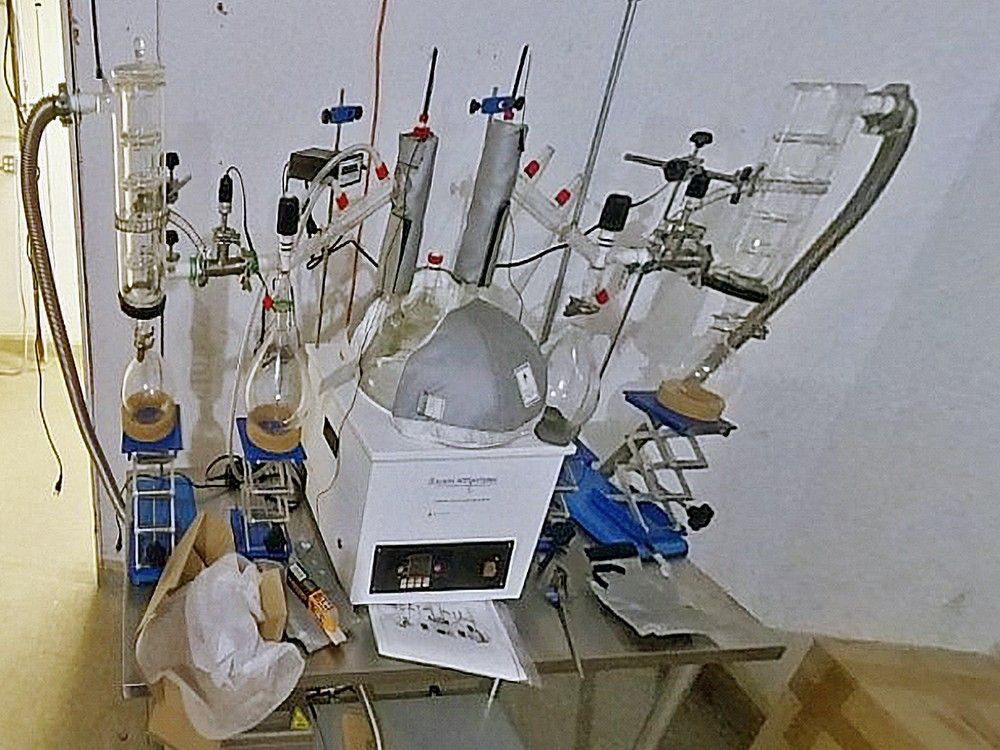
B.C.’s public safety minister has written to the federal government requesting assistance in paying the multi-million tab for cleaning up fentanyl and methamphetamine labs uncovered in recent months.
Postmedia recently revealed that the RCMP’s federal policing program in B.C. is stuck with a $3.6 million bill for removing deadly chemicals found in several illicit labs, including the record-setting Falkland operation raided last October.
Asst. Commissioner David Teboul said the hefty bill would have to be paid out of the RCMP’s operational funds meaning fewer investigations in this province.
David Karn, spokesperson for the B.C. Environment Ministry, confirmed in a statement this week that the letter was sent to the federal government on May 23, “asking it to consider alternative funding arrangements supplemented by the expertise at Health Canada to cover costs for the safe cleanup of criminal drug labs so police can focus their efforts on further enforcement.”
Karn also said that the ministry had incurred its own costs in the past for drug lab cleanups “where hazardous materials posed a risk to human health or the environment — particularly when substances had left the site or were at risk of migrating off-site.”
In those cases, the ministry “pursued recovery through established legal mechanisms, such as the site remediation program or spill response provisions under the Environmental Management Act.”
But he said the act “does not provide a mechanism for the ministry to retroactively reimburse third-party agencies like the RCMP for their incurred costs.”
Conservative MP Frank Caputo, his party’s critic for public safety, said in an interview Thursday that the federal government’s lax approach to the fentanyl crisis has led to the rise of synthetic drug labs in this province.
“When I look at these massive enterprises of fentanyl production, of drug production, of drug trafficking, clearly people see that the juice is worth the squeeze, meaning that they will not face significant enough consequences to deter them from injecting a deadly supply of drugs into the community and we need to change that,” said Caputo, who represents Kamloops—Thompson—Cariboo.
“I don’t look at this issue in isolation. I think it’s part of a greater problem. Obviously, if we didn’t have mass fentanyl producers creating the substance, we wouldn’t be dealing with the cleanup.”
And while civil forfeiture proceedings and restitution orders are existing tools that can be used to eventually recoup cleanup costs, they don’t help with the massive RCMP bill in the short term, said Caputo, who was a prosecutor before he was elected.
“The fact is, the RCMP don’t have the money for this because the government has put us in a deficit of around $90 billion and they’re cutting back in the wrong places,” Caputo said.
“Maybe while they figure out a better funding formula to deal with this stuff in the short term, they should cough up this cash to pay the B.C. RCMP,” he said.
The federal Public Safety Department did not respond to a request for information from Postmedia about the B.C. government letter.
In an earlier emailed statement, spokesperson Max Watson said only that “the cleanup of illegal drug labs is typically the responsibility of property owners. In cases where ownership is unclear or public health and safety are at risk, local governments may be required to step in and manage the cleanup, to ensure the health and safety of their residents.”
There was no direct response to questions about the fact the RCMP in B.C. is stuck with a $3.6 million bill.
B.C.’s civil forfeiture office has filed several lawsuits against owners of properties where synthetic drug labs have been found, including the Abbotsford electrician who owns the rural Falkland property where record amounts of fentanyl and precursor chemicals were located.
Michael Driehuyzen filed a statement of defence , saying he was only the landlord and “did not participate or acquiesce in any unlawful activity at the property done by his tenant or his tenant’s agents.”
Blueksy: @kimbolan.bsky.social